Saubhadra Chatterji in New Delhi
Aspiring poet and photographer, the Shiv Sena scion justifies opposing Rohinton Mistry's book and describes his simple political worldview to Saubhadra Chatterji
Like many other people who aspire to creativity, Aditya Thackeray uses his bathroom for more than one useful purpose: he writes his poems there and saves them on his cellphone.
But unlike other upcoming politicians this young Shiv Sena scion refers to his politics as "social work". The poet-turned-photographer-turned-youth leader of the Shiv Sena also explains how he sees a similarity between politics and art.
"Poetry and photography are mediums through which I see the world from a different angle and then share that perspective with readers or viewers. Politics, too, is a medium to voice my opinion, share my perspective. I think both politics and art come naturally to me," says the 20-year-old Thackeray.
I am meeting Shiv Sena chief Balasaheb Thackeray's grandson, who was recently blooded as a political inheritor, on the lawns of Sena MP Sanjay Raut's bungalow in Delhi over a cup of tea.
...His voice is more like Sachin Tendulkar's
Much more than his father Uddhav Thackeray, Shiv Sena's executive president, Aditya is broadly considered the true inheritor of the Bal Thackeray legacy.
His first book of poems, My Thoughts in White and Black, was published in 2007. The following year, he turned lyricist and released a private album Ummeed, for which he wrote all the eight songs.
Not only did singers like Suresh Wadkar, Shankar Mahadevan, Kailash Kher and Sunidhi Chauhan lend their voice for the album, grandfather Bal Thackeray ensured its inauguration at the hands of Amitabh Bachchan.
Considering the roar of publicity that accompanied his anointment as Yuva Sena chief and a gmail address that includes the word "tiger", the young Sena scion comes across as something of a surprise; his voice is more like Sachin Tendulkar's.
How he earned his stripes
Image: The cover of Rohinton Mistry's book Such a Long JourneyBut he earned his stripes in September when he and his Yuva Sena forced Mumbai University to withdraw Canada-based Rohinton Mistry's book Such a Long Journey from its syllabus.
The young Thackeray regrets not bringing a copy of the book with him to Delhi to show to me exactly what he found objectionable, but stoutly defends his action.
"The book is utterly racist and conveys unwarranted opinions," he says. "Think of yourself as a parent. How would you allow your child to study such a text? Think of yourself as a teacher or a student. How will you read that book in the classroom? You can criticise a policy, that's fine. But abusive language and things put out of context are things that cannot remain on a curriculum. Are we going to teach students racist literature or something that can get them jobs?"
He is also quick to point out that the book has not been banned from the state.
"Anyone who wants to read it can buy a copy from the market. Now, if someone argues about freedom of expression, then remember, The Da Vinci Code was banned in many countries and Satanic Verses was banned in India."
At the Sena's last Dussera rally -- the party's biggest annual event -- Aditya was busy taking photographs before being crowned Yuva Sena chief.
Grandpa sent him to Mamata, but...
His style of photography, he says, is different from his father's.
"Dad specialises in wildlife photography. I'm into abstract, light and shadow and different things that one normally doesn't notice."
His political views do not reflect such shades; not only is he seen as Bal Thackeray's ultimate successor, he religiously follows the old man's ideas.
"My grandfather's style is unique and that works really well. I speak to him on various issues every day. Once when I was going to meet Mamata didi (Railway Minister Mamata Banerjee) he told me, 'You must tell Mamata that whatever the politics, I hope that you will guide me in future.'
"Not many leaders will ask people to take guidance from the rival camp. He also tells me to emulate their good points," he adds.
The advice didn't work: true to form Banerjee refused the young Shiv Sainik any concrete help.
'My studies are not taking a backseat'
Ask him about his agenda for the youth, and he picks two well-worn themes: good education and employment.
"I think today's youth is not guided well although they have more opportunities. Many courses are not oriented for the job market. Many youngsters start their academic career on a different trajectory but end up doing something different. This will be part of my agenda for the youth: to make our syllabus more job-oriented," he says.
On the job front, he is already tying up with Sena unions in places like hotels so that Yuva Sena cadres can be pushed in.
"If you are qualified, then you get a chance to get jobs" is the mantra of the college student who still spends at least four hours a day on academics.
"My studies are not taking a backseat (because of politics). If I am not qualified, how can I make others qualified? My college timing is 8 a m to 12.30 pm. Then I spend two hours every day at the party office. I think if a young guy contributes even one hour weekly towards social work, we can bring about a big change in this country," he says.
Aditya's funda for involving the youth
His group mostly comprises old friends and fresh faces. Since he finds youth participation in politics a "grey area" his solution is simple: There should be a base for youth in politics but to create that base, young people need to work more towards greater acceptability.
"These guys need to come and work and understand what politics and social work are all about. Recently, I met a social activist who was fiercely critical of the corrupt political system. I told him if you don't want people to vote for a particular person then why don't you stand as a candidate? I'll vote for you," he says.
With his uncle's Maharashtra Navanirman Sena seeking to grab the same political space in Maharashtra as the Shiv Sena, the young leader is trying to fan out to other states.
He has already visited Rajasthan, Madhya Pradesh, Gujarat and Uttar Pradesh to expand the Yuva Sena.
What does the grandson of the self-proclaimed champion of Marathi manoos tell other states?
"In Rajasthan I end my speech saying, 'jai Hind, jai Rajasthan'. In Madhya Pradesh, it was jai Madhya Pradesh," he laughs, claiming that even north Indians -- targets of MNS ire -- living in Mumbai complain about the lack of civic facilities.
'We are not opposed to North Indians coming to Mumbai per se'
"We are not opposed to north Indians coming to Mumbai per se. The problem is that the Mumbai infrastructure is ill-equipped to host this vast population. Even the north Indians living there feel more people mean more problems for them," he points out.
As he sees it, he is yet to enter hard-core politics and he likes to call Yuva Sena a 'movement' rather than an organisation.
In his first visit to Delhi after getting the Yuva Sena's top post, he met just one central leader, Mamata Banerjee over a single issue: to get separate coaches for students in Mumbai's suburban trains. But he did his homework.
"Before coming to Delhi, we collected 50,000 signatures and submitted them to Mamata didi. Many people also signed on our posters. It was about taking a cause and making it into a movement," he said. Banerjee, however, gave him little joy: she said a shortage of rakes and other problems came in the way of implementing the idea.
'If I lose my phone, I am finished'
He denounces the perception that Shiv Sena is essentially an urban outfit.
"If you see the last five years' performance, we did very well in rural areas. The Yuva Sena, too, is getting vast support from the rural areas," he adds.
He holds regular meetings in rural Maharashtra. These shows, according to the junior Thackeray, are also adding members to the Yuva Sena family.
If he differs from his grandfather at all, it is in his attitude to the Nehru-Gandhi family. His grandfather was famous for using his sharp tongue against the Gandhi family at poll platforms.
But Aditya thinks "it is very good for Rahul Gandhi to come into politics". Both are vying for the youth space but Aditya Thackeray's worst fear perhaps lies elsewhere: "I can't remember my poems. I store them in my phone. If I lose my phone, I'm finished."

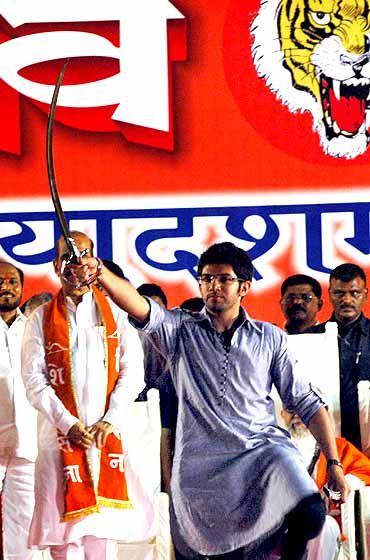
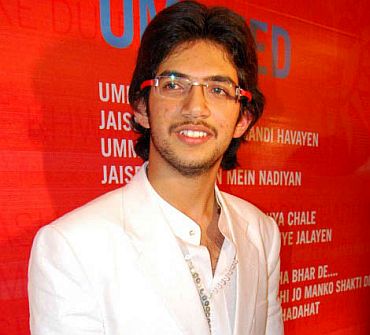

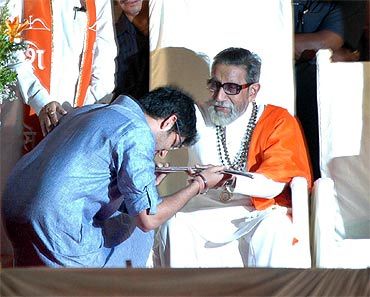
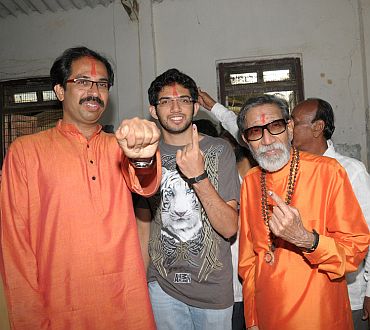
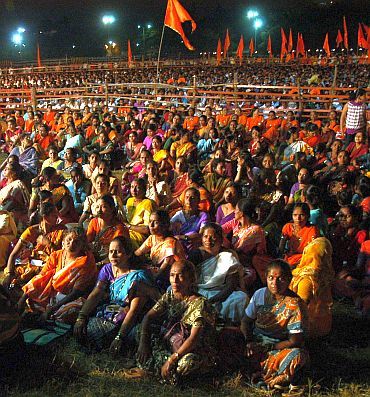
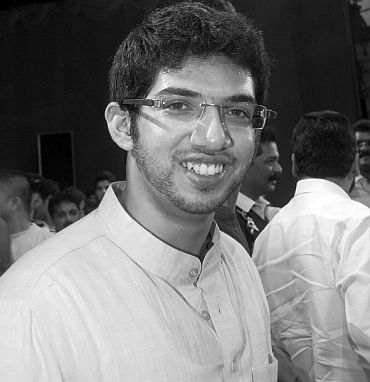
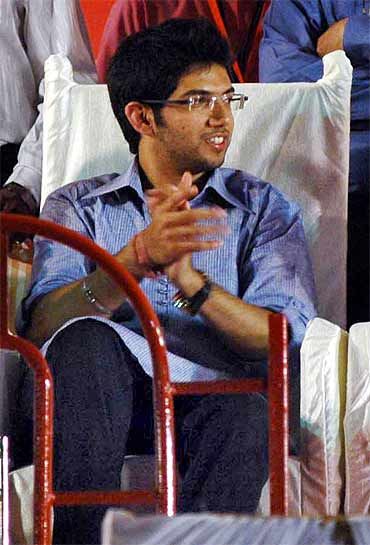

article